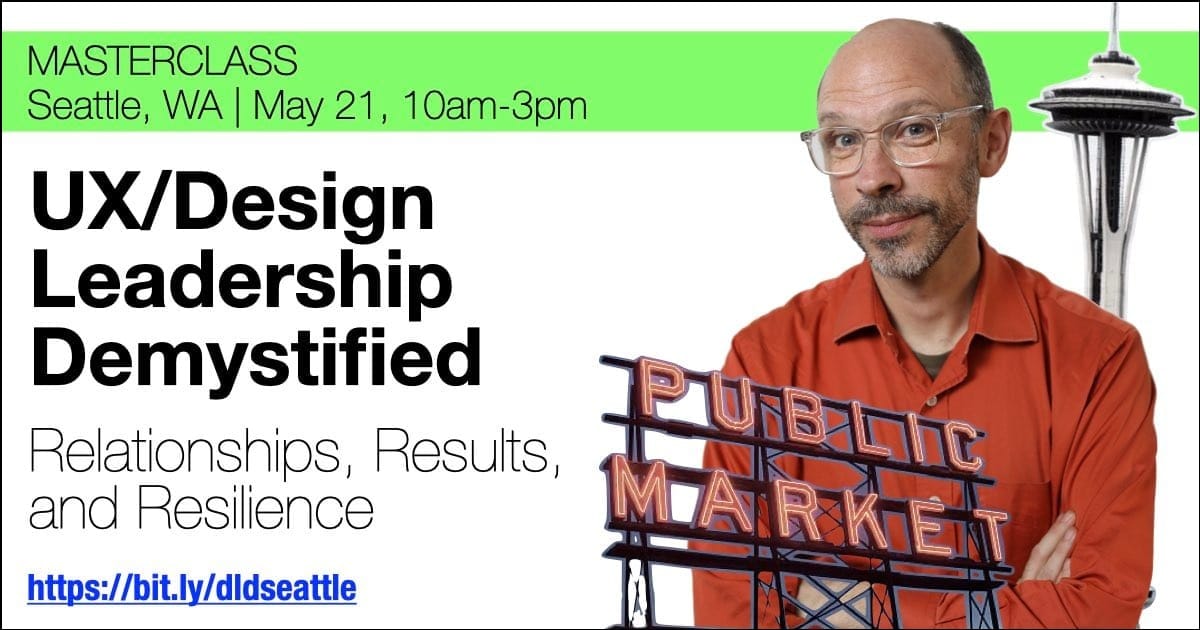[TMA] 🌶️ Spicy(?) Takes on AI, Design Tests, and Cowardice
![[TMA] 🌶️ Spicy(?) Takes on AI, Design Tests, and Cowardice](/content/images/size/w1920/2025/05/photo-1554478299-725a76d9badc.jpeg)
AI doesn't threaten UX/Design—It Exposes It
On the latest episode of Finding Our Way, Jesse and I explore the intersection of UX and AI, taking his "The Elements of UX in the Age of AI" presentation as a starting point.
My epiphany came part way, where it dawned on me that AI isn't redefining UX, but it is most definitely a stress test that reveals, magnifies, and accelerates whatever state your UX is in.
The work for UX/Design leaders is to get crystal clear on your team's value proposition. As Jesse says, "the value that AI potentially can deliver to your team depends a lot on the value that your team is seen as delivering to the larger organization."
For example, In our last episode, Amy Lokey shared how her UX/CX team had already done the work to connect their efforts with desired business value, such that they were entrusted with spearheading the company's product strategy in leveraging AI.
As I shared on the podcast, "If you're feeling fear as a design leader about AI, the solution isn't to AI at it more. The solution is to identify how you can raise the level of trust that others have with you in your organization, such that when you now want to engage with AI, they will listen to you."
Design Tasks Are Indicators You're Not Good At Recruiting
Long ago, I wrote Design Exercises Are Bad Interviewing Practice, and seven years later, I've seen no good evidence to suggest otherwise, though every few months some design leader will advocate for why their team is using them. The latest comes from Thomas Rimmer, who posts, "We just brought brought back design tasks at Intercom," and is seemingly proud to share they ask candidates to spend 2.5 hours working on a "real, shipped Intercom product flow."
The rationale for the design task is that portfolios "rarely tell us how someone actually thinks and works," and that "we need to understand how you work," and assess key behaviors: approaching ambiguity, prioritization, expressing ideas, collaboration, handling feedback, and navigating trade-offs.
All this indicates to me is that the design hiring managers at Intercom lack confidence in their ability. A well-structured portfolio presentation, with a thoughtful set of follow-up questions about the work, conducted by a competent interview panel, will give you all that is being discussed here. And it also recognizes that real design work takes weeks, even months, of discovery, trying things, stakeholder management, iteration, testing, etc. Whereas any 'design task', whether 30 minutes or 2.5 hours or whatever, is design theater.
And if you're going to ask someone to do 2.5 hours of work, you should pay them.
Where Are Our Bold Leaders Now?
The US President is an idiot. That's not news. He doesn't understand even the most basic aspects of economics and international trade.
Congress is not doing its part to keep our Idiot-In-Chief in line, but sadly, that's to be expected. There is a class of public figure whom we'd been lead to expect to take action. As our economy rollercoasters due to a series of needless self-owns, I want to know where are all the bold, risk-taking business leaders who are worth gajillions of dollars because of their willingness to take those bold risks? What we're seeing is that these business "leaders" are bold when circumstances are already favorable, but in the face of inanity and bullying, all they demonstrate is cowardice. It should be pretty straightforward to rein in President Tariffhead. But it requires actual leadership on the part of those with platforms and influence. They'd rather just throw up their hands, shrug their shoulders, and say, "Well, I guess a recession is coming," than actually wield what power they do have for some obvious common good.
Quick Masterclass Update
Last week, I launched Design Leadership Demystified as both a self-paced independent course, and a cohort-based course starting May 22. If you want to learn more before committing, here are two ways. The first is an overview of the material for the course:
The second is: on May 15, I'm offering a free Lightning Lesson titled "Master the Hidden Demands of Design Leadership" , which highlights the core thesis of the course—you need to approach design as a function, and you must master mediating the membrane between design and the rest of the organization.

If you're in Seattle (or know folks who are), we're two weeks out from my in-person masterclass taking place May 21.

![[TMA] New UX/Design Leadership Masterclass Offerings](/content/images/size/w400/2025/04/pip.png)
![[TMA] Thoughts on AI/UX: Quality, Bespokeness, and Adaptation](/content/images/size/w400/2025/04/photo-1584184924103-e310d9dc82fc-1.jpeg)
![[TMA] Tools don't design, people do (yes, this is a little about AI)](https://images.unsplash.com/photo-1465343161283-c1959138ddaa?crop=entropy&cs=tinysrgb&fit=max&fm=jpg&ixid=M3wxMTc3M3wwfDF8c2VhcmNofDF8fEltcHJvdmVtZW50fGVufDB8fHx8MTc0NDYwNDc0N3ww&ixlib=rb-4.0.3&q=80&w=400)
![[TMA] Make Meaningful Metrics](/content/images/size/w400/2025/04/tapemeasure-1.jpg)
![[TMA] Design's challenges make sense with this perspective](/content/images/size/w400/2025/03/conjunction-1.jpg)
![[TMA] Is "Is Design Dead?" Dead?](/content/images/size/w400/2025/03/design-dead-2.png)
Member discussion